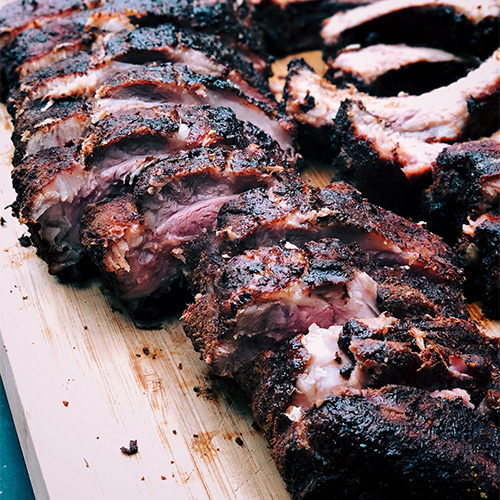 I love me some ribs.
I love me some ribs.
Seriously, there is not a food on earth that beats an immaculately prepared Texas-style slab of baby backs for me. For me, ribs equal joy, period.
Now here’s the thing, you could feel some sort of way about that. Maybe you think ribs are gross. Maybe you’re a vegan and think that I’m a revolting heathen for eating flesh, let alone for ripping from the bone with my teeth. Maybe you’re stuck on the fact that I said “Texas-style” and are thinking that I’m an idiot and that St. Louis, or Memphis, or Carolina style is the way to go. But, you know what’s great about a favorite food – I simply don’t care. You don’t like it – that’s your problem. I know ribs equal joy for me, and that’s all I need to know.
Those that know me know that I actually eat a largely vegetarian diet. Some of them have questioned the sincerity of my convictions when I tell them I eat ribs. Frankly, I don’t care about that either. I’m a hypocrite, deal with it.
I’m also a Jew and therefore eating pork of any kind is an affront to God almighty. I don’t care about that too. In fact, maybe that’s part of why I like it, forbidden fruit and all that. I don’t know, and I don’t care. I just want some ribs, please.
What is so funny about favorite foods is that we know it, deep in our bones, or perhaps more accurately deep in our guts. It is a fact, at least to us. Nobody’s disgust with us, questioning of our morals, or allegations of hypocrisy can shake us. That is our favorite food and nobody is going to talk us out of it, no matter how rational, reasonable, factual, or anything else they may be. It doesn’t matter if you’re favorite food is chicken piccata or goat testicles, you are not to be swayed.
Joy is the crystal ball that illuminates who we are when we are at our best and most able to bring our whole selves to the work.
The Big Joy Theory Tweet
So, what in the hell does any of this have to do with leadership, I can hear you wondering. Well, it has to do with leadership in that, when we can get clear on what brings us joy, we become strong, convicted, immovable. And, so long as we hold to that truth, own it, and express it clearly, others can choose to either opt-in or out (you’re always welcome to eat ribs with me, or, if you think they are gross, stay at home, I’ll happily eat them by myself, no judgment). Others can also lean in to support us (“Hey, Tomer, did you hear about that new rib joint?”) and further our endeavoring in joy. And, over time, we become experts in our joy (“Yeah, thanks! That place is pretty good, but THE BEST ribs come from this other place.”).
But, when we try to do the same thing in our personality, in our leadership, we are not allowed to be so immovable. Just today I was speaking with a leader who was realizing that she gains significant joy from traveling, mostly because it means she’ll meet new people. That is part of her brand, her leadership style, and just like a favorite food, that is joy for her. But, people kept knocking her off of her joy. “Travelling as a woman is dangerous.” “Who likes to constantly meet new people?! Just have a few friends and hold them close.” “Isn’t that expensive?” And, as a result, she began to question herself. Maybe she was weird. Maybe they were right. Maybe she should just find another way to get her joy.
You don't know me until you know my joy.
Why do we do that? Why is it that something as trivial as a favorite food we’ll be so adamant about, but something far more meaningful, like how we live and lead best, that ties to our personal and professional outcomes, we can be so comparatively easily swayed? In truth, the corporate mindset made joy irrelevant to our bottom-lines generations ago. That is to say, that joy was turned from a powerful motivating force that could bring us clarity about who we are as a leader to a simple moment that was to be quickly forgotten. There is a powerful clarity of who you are in your whole self that can only be realized through joy. So, I can tell you that it is a problem that joy has been left outside of our understanding of who we are as leaders and how we can lead well in the world around us. Moreover, it is a problem that often lies at the root of many failed businesses and unsuccessful leaders.

So, how do we fix this problem? Well, the answer is simple, yet complex – choose joy. It is about understanding what our joy even looks like, beyond favorite foods, and all the way into our souls and all the way back to our earliest childhood memories. Get back in touch with all of those moments that you were amazing, and start to understand the themes. What does your joy look like? Who was around to see it and help it manifest? What is the context in which it is most present?
Start by exploring the moments in your life that come to mind when you think of the time(s) you were the most confident or most productive or most happy or most clear or most magnetic to others – any moment that really stands out, at any point in your life, for all of the right reasons. Pull those moments together and examine them for learnings on what your joy really looks like and how you can have more of it in your life. And, when you uncover those things, hold on to them – they are sacred. These are the building blocks of your joy and you being in your whole self. These are the things that make you fully who you are and can be, and that is more important and more valuable than anything! As such, don’t ever let anyone knock you off of those truths, regardless of their judgment or even their position in your life. And, should you ever struggle or falter, just know that we at The Big Joy Theory are here to help get you back into and operating fully in your joy. Because, when it comes to the that which puts you and keeps you in your joy and whole self, we need you to be at least as adamant and twice as clear as I am on some ribs.

